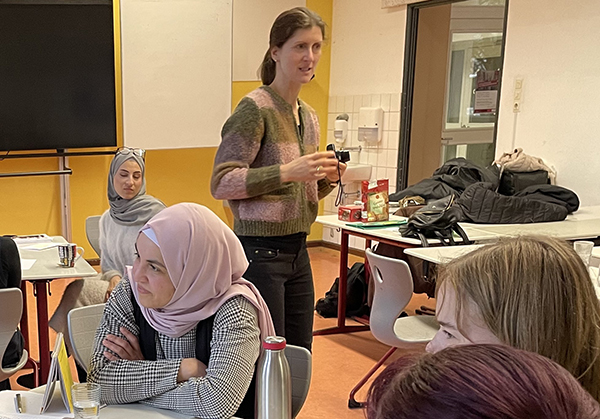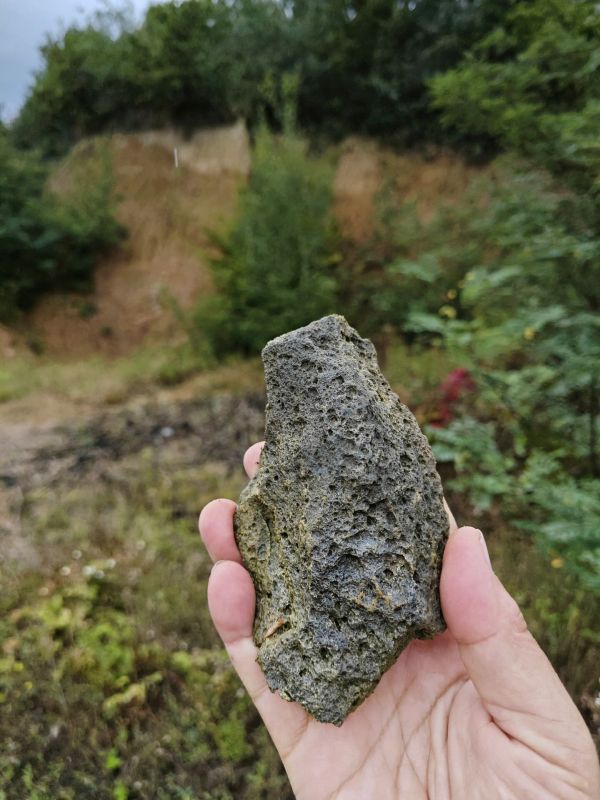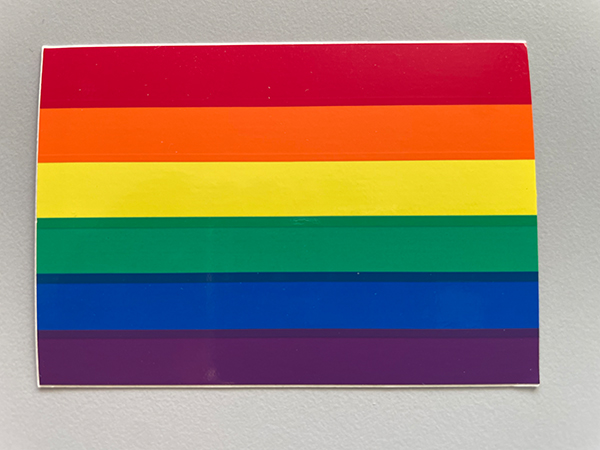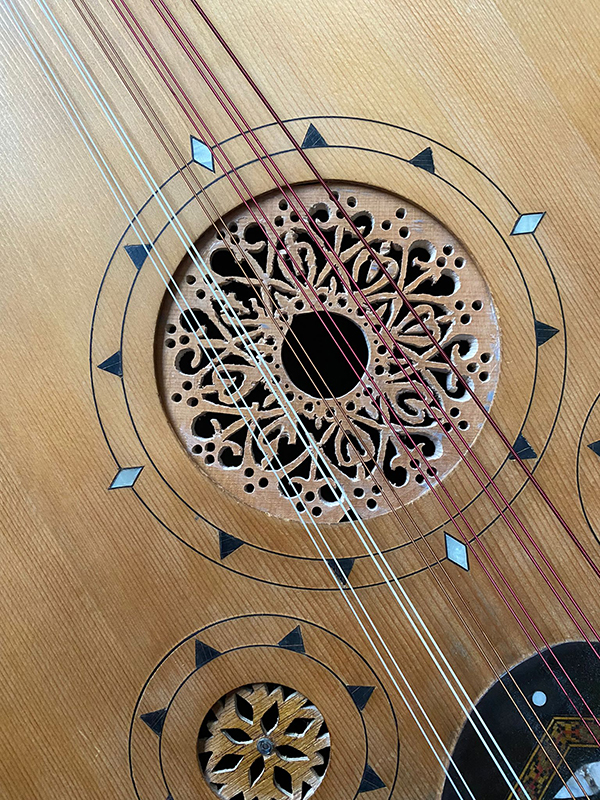By Ute Kaiser
Lobna Alhindi has recurring nightmares. In them, the Syrian woman sits in a rubber dinghy with her young son, as she did at the end of 2014—on a hasty flight from Turkey to Greece. What the tuenews INTERNATIONAL employee and her colleagues Oula Mahfouz and Batool Hadous reported at Wildermuth-Gymnasium got under the skin of the eleventh-graders on the social studies course. Joseph, who has already spoken to refugees on the bus, in cafés or at events, had a new experience: talking to someone who „fled in a rubber dinghy“. He wasn’t the only one who was impressed by how „open and free“ the three guests were when talking about themselves and their experiences. Lucy also found it „very exciting“ and was impressed by „how they talked about the details of their escape“.
21 students led by advanced course leader Anne Voykov had prepared thoroughly for the interviews shortly before the Christmas holidays. The students had lists with lots of questions in front of them. During the interviews, they made sure that their guests did not have to talk about anything that was too personal. But the three Syrians, who are now German citizens, talked about all sorts of things: from their reasons for fleeing to their experiences during their flight and when they arrived in Germany, including the difficulty of obtaining documents from Syria, to their current life in the country that Batool Hadous calls a „second home“.
Arabic teacher Oula Mahfouz fled via Egypt and Libya. In a country characterised by power struggles after the fall of dictator Muammar al-Gaddafi, she was worried about the safety of her family. „It was very sad and dangerous,“ said the mother of five. Her daughters and sons were „very discriminated against“.
The crossing to Italy was a horror—although, according to Oula Mahfouz, „fortunately it only took 14 hours“. A boat that was far too small, on which she sat with hundreds of other refugees, but separated from two of her children. The armed smugglers had taken the boat’s passengers’ few dates, a little water and their rucksacks.
Oula Mahfouz originally wanted to join relatives in Denmark with her family and already had train tickets. But she was picked up in Germany. Her escape initially ended in Nuremberg. In the initial reception centre, she was „always afraid of what would happen“. But she also felt it was „important that we were safe“. The family has long since arrived in the Tübingen district. The younger children are still at school, the two older daughters have passed their A-levels and are studying.
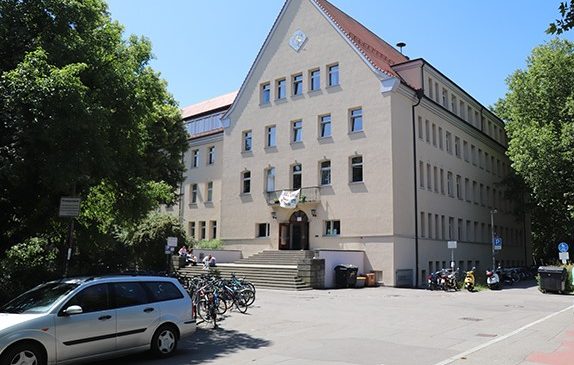
Batool Hadous graduated from Kepler-Gymnasium and is currently working as a volunteer at tuenews. „It was difficult to have contact with Germans,“ she says about the early days. Even young people knew almost nothing about the situation in Syria. Many encounters were hurtful. „Not only do I have a different eye colour, I also wear a headscarf.“ One woman tried to tear off Batool Hadous’ hijab and insulted her. Young people asked how she showers or whether she has no hair. Batool Hadous takes the offensive. She tries to provide information about her reasons for fleeing and her religion. After just eight months, she spoke German to someone for the first time. Batool Hadous wants to learn and educate. Whenever she can, she tries to talk to people about their customs and traditions.
Because she wanted to find a „second home with all the rights and obligations“ in Germany, she got involved and is still involved with organisations such as Wüsten Welle, tuenews INTERNATIONAL and the adult education centre. Lucy asked Batool Hadous what the ever-growing AfD was doing to her. „I’ve experienced too much to be afraid,“ said the 21-year-old. There are now also many refugees who are German citizens. „We are part of this society.“ That also means: „We will vote and we know what racism is.“
The women rule out returning to Syria. Lobna Alhindi believes, „I would ruin the lives of my three children.“ But she also knows of many refugees who don’t feel comfortable, are homesick, don’t want to integrate and, unlike the language-enthusiastic former primary school teacher, don’t want to learn German properly. She also misses the lively life at weekends, like in the Syrian shopping streets, the spontaneous visits, which are rather unusual in Germany, or the barbecue afternoons by the sea. But she and her Syrian friends have arrived. „They all work or are self-employed.“ Max asked Lobna Alhindi what advice she would give to people who want to flee a country at war. „Don’t waste any time and learn the language straight away.“ And: „If they had the chance to live in Germany like me: be happy.“
Info: The interview at Wildermuth-Gymnasium was conducted by the pupils for the „Tagblatt in der Schule“ project, in which the „Schwäbische Tagblatt“ in Tübingen is involved.
tun23121501
Die tuenews-Mitarbeiterinnen Oula Mahfouz, Batool Hadous und Lobna Alhindi sprachen mit den ElftklässlerInnen vom Leistungskurs Gemeinschaftskunde des Tübinger Wildermuth-Gymnasiums über ihre Flucht und ihr Ankommen in der deutschen Gesellschaft. Leistungskurs-Leiterin Anne Voykov (Mitte) fotografierte die Gesprächsrunden. Foto: tünews INTERNATIONAL / Ute Kaiser.
000895
002243

